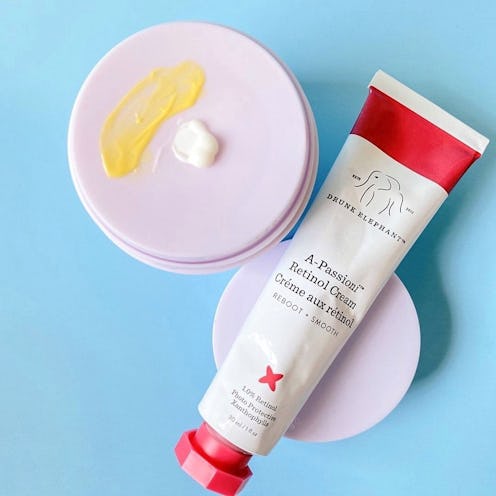(Skin)
How To Use Retinol If You Have Acne-Prone Skin
Put down the toothpaste.

Toothpaste might have been the first product you used in an effort to clear your acne, but hopefully, at this point, you've discovered there are better ways to treat flare-ups (read: not with toothpaste). But if pimple patches and spot treatments aren't quite doing the trick, consider turning to something that's a bit stronger. Enter retinol products for acne. As it turns out, in addition to its anti-aging benefits, the ingredient works wonders when it comes to banishing blemishes.
Read more: How To Treat Fungal Acne On Your Face When Nothing Else Works
According to Dr. Howard Sobel, founder of Sobel Skin and attending dermatologic surgeon at Lenox Hill Hospital in New York, "Retinol helps speed up cell turnover and regeneration, and exfoliates keratinocytes, the cells on the outermost layer of the skin." Additionally, Dr. Sobel says the ingredient unclogs pores, which in turn keeps your skin looking youthful while minimizing and preventing fine lines and wrinkles.
Read more: Can You Use Retinol & Vitamin C Together? Experts Explain
Read more: 15 Retinol Facts That You Probably Didn’t Know
And while, yes, there are other acne-fighting ingredients you can use, Dr. Hope Mitchell, M.D., FAAD, the founder and CEO of Mitchell Dermatology says retinol is the most multi-tasking option out there. "For example, benzoyl peroxide is a common ingredient for acne treatment, but it's more anti-inflammatory," she explains. "It's really good for people who have inflammation, but not the best for blackheads and whiteheads." Another common ingredient for acne-prone skin is salicylic acid due to its exfoliating properties. However, the dermatologist says it doesn’t pack a punch like retinol. In fact, in addition to exfoliating the skin, retinol does everything from improving texture to even helping with acne scarring. "It's really the gold standard for everything."
Dr. Mitchell goes further to say retinol is one of the primary non-negotiable steps in any skin care routine (a close second to sunscreen). She recommends applying it at night, as opposed to the morning to protect the product from being broken down by the sun. After you cleanse the skin, you can apply any serum you regularly use (if you use one), and once it's absorbed for 30 seconds, you can then go in with retinol, followed by a moisturizer. For those with irritated skin or who have experienced dryness from retinol in the past, Dr. Mitchell recommends the sandwich technique, which means applying a moisturizer or hydrating serum first, like hyaluronic acid, your retinol product, and then finish off with your moisturizer. But regardless of your skin type, she says you should always apply a moisturizer after your retinol. (The dermatologist's particular favorites are from CeraVe and Aveeno's new Calm + Restore Oat Gel Moisturizer.)
While the recommendation above is fairly standard, for those new to the retinol game, Dr. Sobel recommends starting off slow and steady. One of the most common mistakes the dermatologist sees is people using the ingredient every single night right off the bat. "For many people, that’s too often especially as your skin adjusts, so start with a day or two a week in the evenings," he recommends. If you aren't experiencing any irritation, then up your application to four times a week, and eventually work your way to daily use. And when it comes to choosing a strength, Dr. Mitchell suggests beginning with a low percentage such as .01% or .03%. Once you're ready to move up to a more intermediate strength, you can choose a product with .04% to 1%.
Dr. Mitchell is also a big advocate for blending retinol products with other skin-loving ingredients. "For example, retinol can be combined with ceramides which add hydration to the skin, as well as hyaluronic acid, which helps to keep the skin hydrated and prevent irritation," she explains. One product that does this is Cerave's Skin Renewing Retinol Serum. The formula includes retinol, hyaluronic, and ceramides, which the dermatologist loves for those who live in colder climates. "The combination of ceramides and hyaluronic acid helps to retain the skin’s natural moisture," she explains.
On the other hand, for those with acne-prone skin, Dr. Sobel says to avoid mixing retinol products with ingredients that might irritate blemishes, such as fragrances and oils. "Don't mix with vitamin C, benzoyl peroxide, and AHA/BHA acids," he says. "AHA and BHA acids are exfoliating, which can dry out the skin and cause further irritation if your skin care routine already includes retinol. As for benzoyl peroxide and retinol, they cancel each other out."
Are you ready to give retinol a whirl to combat your acne? Ahead, find nine products recommended by dermatologists.
We only include products that have been independently selected by TZR's editorial team. However, we may receive a portion of sales if you purchase a product through a link in this article.